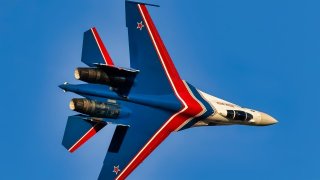Ukraine May be Winning the Information War in Kursk
Only time will tell whether Ukraine can continue its Kursk offensive into Russia. But this offensive has the potential to positively influence Western perceptions, sustain funding and material support for Ukraine, and degrade Russian domestic support for the war. Ukraine’s strategic gamble in the information space might pay off.
Russia has been invaded for the first time since the Second World War. Ukrainian Armed Forces, not pro-Ukrainian Russian separatists, not ambiguously affiliated units conducting small raids, have held a foothold for over a month. Ordinary Russians living along the border have been displaced. The initial Russian response appeared inept, raising the question of whether the military and the Federal Security Service (FSB) can protect its citizens.
These messages and related imagery circulate across major news networks and social media, with new footage emerging every day. Even if the incursion doesn’t divert thousands of Russian forces or last long, analysts argue that it has already been a “nuclear bomb” of sorts in the information space.
Perceptions Matter
The information aspect of warfare is no novel concept, but its evolution and importance have increased rapidly in the digital age.
The hundreds of captured Russian soldiers paint a vivid picture of ill-equipped and demoralized forces. The employment of high-caliber Ukrainian forces in the offensive creates an impressive image of what Western-provided professional training and equipment produce, which is starkly contrasted with the Russian army’s conscripts and aging equipment.
The offensive is affecting domestic Russian audiences as well. Recently, influential Russian military bloggers have criticized the Russian military and FSB response, with the situation being described as “hell on earth” by one blogger.
Other articles describe the humanity and empathy that Ukrainian soldiers show toward Russian civilians, contrasted with the horrors that Ukrainian civilians often experience at the hands of Russian troops. For example, after being injured in a drone strike while heading to rescue his mother from the town of Sudzha in the Kursk oblast, dual Russian and American citizen Oleg Grishchenko and his mother were escorted by Ukrainian forces to Sumy for treatment at a local hospital.
It is no coincidence that this offensive occurred during the summer. It serves two purposes. First, this is prime season for offensive operations, as we’ve seen both Ukraine and Russia launch large offensive operations every summer throughout the war.
Although favorable weather and terrain conditions make it easier for mechanized formations to maneuver in the summer, that’s not the only reason Ukraine made its move now. Ahead of critical U.S. and European election cycles, when Ukraine fatigue threatens continued support for the war effort, this operation is a message to Western backers: Ukraine can succeed – especially with the help of Western-provided platforms and munitions.
The Weeks and Months Ahead
The Kursk offensive continues to put pressure on the U.S. and other Western countries to lift restrictions on Ukraine’s use of long-range weapons systems, such as the Army Tactical Missile System (ATACMS) and Storm Shadows in Russia. The Biden administration has, over time, eased its restrictions on the delivery and employment of various weapons systems by the Ukrainian Armed Forces.
It is not out of the realm of possibility that this offensive could be a golden ticket for further relaxation, leading to U.S. and Western-provided long-range weapons systems being used to strike deeper inside Russia. This all comes down to how Ukraine informationally conveys the Kursk offensive: if it continues to deliberately minimize civilian casualties and damage to critical infrastructure, the U.S. or other Western allies may ease more of their restrictions on the employment of long-range weaponry.

A seemingly unrelated event on the other side of Europe could also have far-reaching implications in the war’s information space. Pavel Durov, the head of the notorious messaging and social media app Telegram, was recently arrested in France, accused of failing to prevent illicit activity on the app, among other charges. Telegram has spread information, both true and false, across Russia, where other forms of media have largely been banned or censored.
Telegram has been integral to how Russian forces have communicated throughout the war. Its secure communications system often proved more reliable and convenient than secure Russian military communications infrastructure.
Fears that France may be seeking access to encrypted messages led Russian officials to tell users to, “delete those conversations right now and not do it again.” Widespread curtailing of pro-Russian use of Telegram could play in Ukraine’s favor, allowing them to dictate the narrative about the Kursk offensive, and the broader war, instead of Russia.
Whether Ukraine can continue its offensive into Russia, only time will tell. But this offensive has the potential to positively influence Western perceptions, sustain funding and material support for Ukraine, and degrade Russian domestic support for the war. Ukraine’s strategic gamble in the information space just might pay off.
About the Author
Hunter Stoll is a defense analyst at RAND, a nonprofit, nonpartisan research institution, where he focuses on Eurasian security issues and information warfare. He is also a Captain in the U.S. Army Reserve. He holds an M.A. in security studies from Georgetown University. The views expressed in this piece are the author’s own and do not reflect the views of RAND or the U.S. Army Reserve.
Image Credit: Creative Commons and/or Shutterstock.


